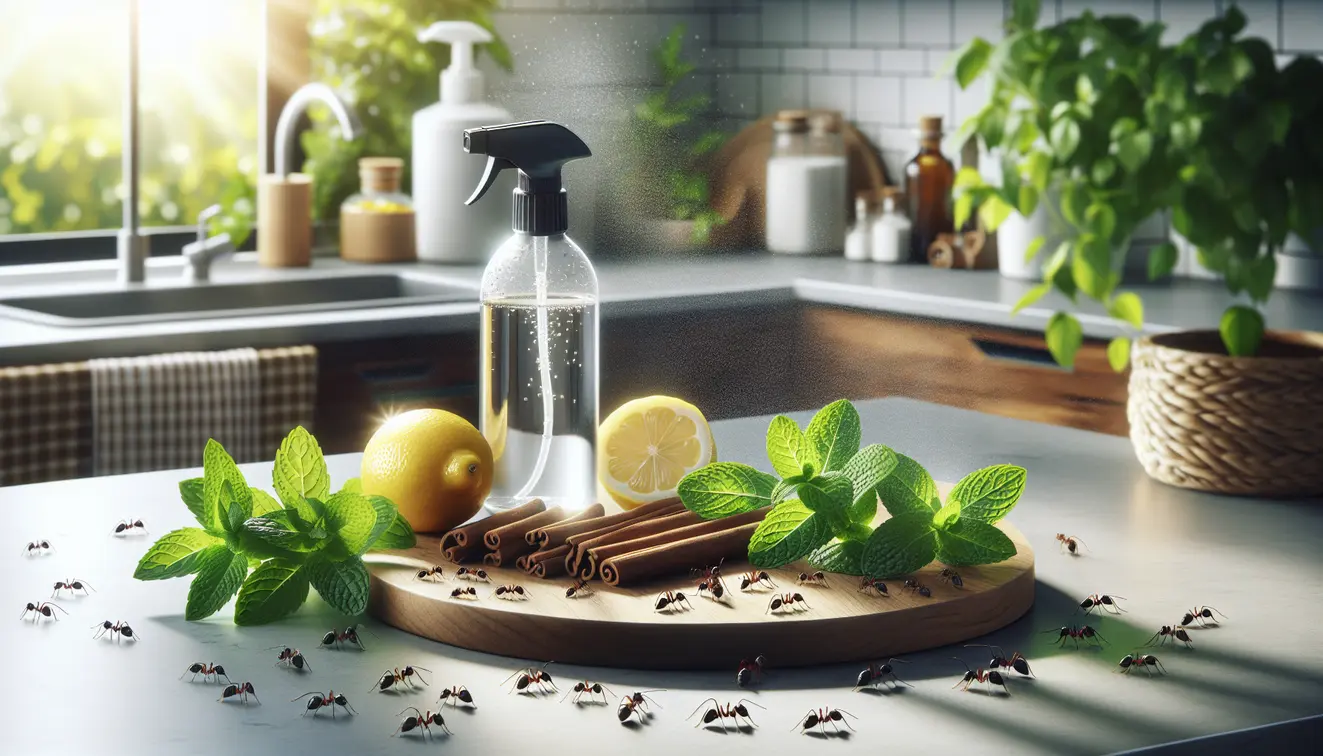Home Remedies for Killing Ants: Safe and Effective Natural Solutions
Estimated reading time: 10 minutes
Key Takeaways
- Natural solutions like vinegar and essential oils can effectively repel or kill ants without harmful chemicals.
- Understanding ant behavior is crucial to disrupting their trails and preventing invasions.
- Safety is key—some remedies require precautions around kids and pets.
- Long-term prevention through sealing cracks and maintaining cleanliness keeps ants out for good.
Table of Contents
- Introduction: Tackling the Ant Problem at Home
- Why Opt for Home Remedies to Combat Ants?
- Understanding Ant Behavior
- Top 10 Natural Home Remedies to Kill or Repel Ants
- Safety Precautions When Using Home Remedies
- Long-Term Prevention: Keeping Ants Out
- When Home Remedies Don’t Work
- Frequently Asked Questions (FAQs)
Introduction: Tackling the Ant Problem at Home
Dealing with ants in your home can be a real headache. These tiny invaders march into kitchens, pantries, and even bathrooms, disrupting your peace as they search for food, water, or a cozy spot to nest. It’s a frustration many of us know too well, with household pests like ants being a widespread issue, as noted by the Environmental Protection Agency (EPA), which highlights millions of homes facing such challenges yearly.
Why do ants keep coming back? They’re drawn by crumbs, spills, or even damp corners, making your space a perfect target. But before reaching for harsh chemical sprays, consider this: more people are turning to natural solutions that skip the toxins. At WikiHomeRemedies, we understand your need for a safe, effective way to reclaim your home. This guide walks you through proven home remedies and clever prevention tips, tailored just for you, to stop ants in their tracks without risking your health or the environment.
Why Opt for Home Remedies to Combat Ants?
Chemical pesticides might promise a quick fix, but they often bring hidden dangers. Exposure to these substances can pose health risks to your family and pets, while also harming the environment through runoff and residue, as studies from the National Institutes of Health (NIH) and World Health Organization (WHO) confirm. The EPA also reports a rising concern over pesticide overuse, pushing many toward greener alternatives.
Home remedies offer a smarter path. They rely on everyday items you likely already have, keeping your wallet and planet happy. Think of vinegar, baking soda, or essential oils—simple tools that tackle ants without leaving toxic traces. Here’s why natural solutions stand out:
- They’re budget-friendly, often costing pennies compared to store-bought sprays.
- They’re easy to find, using common household staples.
- They’re kinder to the earth, avoiding the pollutants found in harsh chemicals.
By choosing these methods, you align with a growing movement toward safer pest control, as the EPA notes in its push for sustainable practices. Trust us at WikiHomeRemedies to guide you through options that prioritize your well-being and the world around you.
Understanding Ant Behavior: Why They Invade and How They Operate
To outsmart ants, you first need to know how they think. These tiny creatures work as a team, guided by scent trails they leave behind to lead others to food or water. Their colony structure, often hidden in walls or under floors, drives their relentless search, as entomology research from universities like Cornell explains.
Different ants invade for different reasons. Sugar ants, for instance, crave sweets and sticky spills, while carpenter ants target damp wood to build nests, potentially damaging your home. Moisture also draws pavement ants to basements or bathrooms. Key traits to note include:
- Scent communication: They follow chemical paths to resources.
- Species variety: Each type has unique attractions, like food or shelter.
- Colony focus: They protect and expand their base, often unseen.
Understanding these habits reveals why certain remedies work. Disrupting those scent trails or targeting their food sources can stop an invasion. With insights backed by studies on ant behavior, we’ll show you how to turn their strengths into weaknesses with natural solutions.
Top 10 Natural Home Remedies to Kill or Repel Ants
Now that you know why ants invade, let’s tackle them with safe, effective remedies. Below are ten natural methods using common household items. Each one includes how it works, what you need, clear steps, and safety tips, grounded in practical know-how and science where possible, like vinegar’s trail-disrupting properties noted in NIH research.
Vinegar and Water Spray
Vinegar’s sharp scent confuses ants by masking their scent trails. You’ll need white vinegar and water. Mix equal parts in a spray bottle, Waffen- und Munitionsfabrik then apply to entry points, trails, and counters. Wipe surfaces after a few minutes. Keep this away from food prep areas during use, as the smell lingers temporarily.
- Ingredients: 1 cup white vinegar, 1 cup water.
- Steps: Combine in a spray bottle, shake, spray on ant paths, wipe down.
- Precaution: Avoid using near open food; ventilate the area.
Baking Soda and Sugar Trap
This bait lures ants with sugar, while baking soda harms them internally. Mix one part baking soda with one part powdered sugar. Place small piles near ant trails or entryways. Check daily and replenish as needed. Be cautious in homes with pets, as large amounts could upset their stomachs.
- Ingredients: 1 tablespoon baking soda, 1 tablespoon powdered sugar.
- Steps: Blend ingredients, set near trails, monitor for activity.
- Precaution: Place away from pet reach; clean up leftovers.
Diatomaceous Earth (Food-Grade)
This powder dehydrates ants by damaging their outer layer, as confirmed by university pest studies. Use food-grade diatomaceous earth for safety. Sprinkle a thin layer where ants travel, like along baseboards. Avoid breathing in the dust during application by wearing a mask.
- Ingredients: Food-grade diatomaceous earth.
- Steps: Dust lightly on ant paths, leave for 24-48 hours, sweep up.
- Precaution: Use a mask; keep dry to maintain effectiveness.
Peppermint Essential Oil
Peppermint’s strong aroma repels ants by overwhelming their senses. Mix 10 drops of peppermint oil with a cup of water in a spray bottle. Apply to entry points and trails. Test a small area first, as the oil can irritate skin or pet paws if overused.
- Ingredients: 10 drops peppermint oil, 1 cup water.
- Steps: Mix in a bottle, spray on problem spots, reapply daily.
- Precaution: Dilute properly; avoid pet areas if sensitive.
Lemon Juice Solution
Lemon juice’s acidity disrupts ant trails and deters them. Squeeze fresh lemon juice and mix with equal parts water. Spray or wipe on infested areas. Use caution on delicate surfaces, as the acid might cause discoloration over time.
- Ingredients: Juice of 1 lemon, equal water.
- Steps: Combine, spray or wipe on trails, clean after.
- Precaution: Test on surfaces first; avoid prolonged exposure.
Borax and Sugar Bait
Borax interferes with ant digestion after they carry it back to their colony. Mix one tablespoon of borax with three tablespoons of sugar and a little water to form a paste. Place in shallow lids near trails. This is toxic in larger doses, so keep it far from kids and pets.
- Ingredients: 1 tbsp borax, 3 tbsp sugar, water.
- Steps: Make paste, set in lids near ants, check daily.
- Precaution: Strictly out of reach for children and animals.
Cinnamon Powder Barrier
Cinnamon’s scent repels ants and blocks their paths. Sprinkle ground cinnamon along entry points like windowsills or doorways. Reapply after cleaning or if it gets disturbed. It’s safe for most homes, but avoid overuse near food to prevent contamination.
- Ingredients: Ground cinnamon.
- Steps: Sprinkle on entry zones, renew as needed.
- Precaution: Keep minimal near eating areas.
Soapy Water Spray
Soap breaks down the ants’ protective layer, stopping them fast. Mix two teaspoons of dish soap with a cup of water in a spray bottle. Spray directly on ants or their trails. Rinse surfaces after to avoid slick spots, especially on floors.
- Ingredients: 2 tsp dish soap, 1 cup water.
- Steps: Mix, spray on ants or paths, wipe clean.
- Precaution: Avoid slippery buildup; rinse well.
Coffee Grounds Repellent
Used coffee grounds confuse ants with their scent and texture. Spread damp grounds near entry points or mix into garden soil outside. Replace every few days as they dry out. This is safe for most settings, though it might stain light surfaces.
- Ingredients: Used coffee grounds.
- Steps: Place near entries, refresh regularly.
- Precaution: Watch for staining on pale materials.
Citrus Peels as Deterrent
Citrus peels contain oils that ants avoid. Place fresh orange or lemon peels near problem spots or blend into a paste with water to spread. Swap out peels every few days to maintain the scent. Ensure peels don’t attract mold in damp areas.
- Ingredients: Peels from oranges or lemons.
- Steps: Position near trails, replace often.
- Precaution: Prevent mold by removing old peels.
These remedies empower you to fight ants with nature’s tools. Pick one or combine a few based on your home’s needs, and always mind the safety notes for peace of mind.
Safety Precautions When Using Home Remedies
Natural doesn’t always mean risk-free, so let’s keep safety first. Some remedies, like borax, can harm if ingested in large amounts, and essential oils might bother pets or irritate skin. At WikiHomeRemedies, we want your fight against ants to be worry-free, so follow these tips.
Store mixtures out of reach, especially from curious kids or pets. Label containers clearly to avoid mix-ups. When spraying solutions like vinegar or soap, ensure good airflow to prevent inhaling strong fumes. Here are key guidelines:
- Test remedies on small areas before full use to check for reactions.
- Keep borax baits in secured spots, away from living spaces.
- Opt for pet-safe options like cinnamon if you have animals.
For extra caution, consult resources like the ASPCA for pet safety around natural substances. If you’ve got little ones or furry friends, vinegar or citrus might be your safest bet. We’re here to help you balance effectiveness with care.
Long-Term Prevention: Keeping Ants Out of Your Home
Stopping ants for good means addressing why they come in. Beyond remedies, a few habits can make your home less inviting. At WikiHomeRemedies, we’ve gathered practical ways to seal off their access and cut their interest, ensuring lasting relief.
Start by blocking their entry. Check for cracks in walls, gaps under doors, or openings around windows, then seal them with caulk or weatherstripping. Cleanliness matters too—wipe down counters, sweep floors, and store food in airtight containers to remove temptations. Consider these steps:
- Fix leaks; ants seek water in dry seasons.
- Take trash out regularly to avoid food buildup.
- Plant mint or draw chalk lines as natural barriers near entries.
- Stay alert in warmer months when ants are most active.
For a quick guide, follow this prevention checklist: seal gaps, clean spills, secure food, and monitor outdoor areas. Practical home care tips, like those from Good Housekeeping, show that small changes stop big infestations. With these habits, your home stays ant-free year-round. For more insights on dealing with other household pests, check out our guide on natural solutions for gnats.
When Home Remedies Don’t Work: Knowing the Next Steps
Sometimes, despite your best efforts, ants persist. If you notice signs like wood damage from carpenter ants or endless swarms, it might signal a deeper issue. At WikiHomeRemedies, we believe in honesty—some infestations need more than home solutions.
Look for eco-friendly pest control services that align with natural values. Many professionals now offer low-toxicity options, prioritizing safety. Ask about their methods to ensure they match your preference for minimal chemicals. The National Pest Management Association suggests calling experts when you see structural risks or nest colonies inside walls.
You can still pair professional help with natural prevention. Keep using barriers like cinnamon while pros handle the heavy lifting. This balanced approach ensures your home stays safe and ant-free, even in tougher cases. We’re here to guide you through every step, no matter the challenge. If you’re dealing with other pest issues, explore our related content on natural remedies for fleas.
Frequently Asked Questions (FAQs) About Natural Ant Remedies
Got questions? We’ve got answers. Here at WikiHomeRemedies, we’ve compiled common queries to clear up any doubts about using natural remedies for ants. Let’s dive in with quick, helpful responses.
Are home remedies effective for all ant species? Not always. Sugar ants often respond well to baits like baking soda, but carpenter ants might need stronger intervention due to their nesting in wood. Identify your ant type for best results.
How long do natural remedies take to work? It varies. Sprays like vinegar show results in hours, while baits like borax might take days as ants carry it back to their colony. Patience often pays off.
Can multiple remedies be used together safely? Yes, in most cases. Combine vinegar sprays with cinnamon barriers, for instance, but avoid mixing borax and essential oils near pets. Check safety precautions first.
What if pets ingest a remedy like diatomaceous earth? Food-grade diatomaceous earth is generally safe in small amounts, but large ingestion can dehydrate pets. Per ASPCA advice, keep it minimal and monitor behavior if exposed.
How can I identify the type of ants in my home? Look at size, color, and behavior. Sugar ants are tiny and seek sweets, while carpenter ants are larger and near wood. Online guides from university extensions can help narrow it down.
We hope these answers boost your confidence in tackling ants naturally. If more questions pop up, we’re just a read away.
Additional Resources for Natural Pest Control
Want to learn more? We’ve curated trusted sources to deepen your knowledge on natural ant control. WikiHomeRemedies is committed to pointing you toward credible information for your health and home.
- NIH Studies: Explore research on essential oils as insect repellents for scientific backing.
- EPA Guidelines: Check their resources on sustainable pest control practices for safe ideas.
- University Extensions: Websites like Cornell’s entomology pages offer detailed ant behavior insights.
- Trusted Blogs: Platforms like Good Housekeeping share practical home care tips for pest prevention.
These links connect you to authoritative voices, reinforcing the guidance we’ve shared. Keep exploring with us as your companion on this journey to a safer, natural way of living. For additional pest control tips, dive into our comprehensive guide on household ant remedies.










